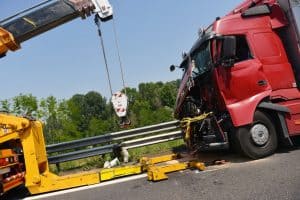Electronic Logging Device Data in Truck Accident Investigations

The National Transportation Safety Board (NTSB) has recommended that the Federal Motor Carrier Safety Administration (FMCSA) should require all commercial trucks and buses to be equipped with electronic logging devices to improve the accuracy of tracking the driver’s compliance with the Hours of Service (HOS) regulations. ELDs are not yet required for all large commercial trucks yet, as they are being phased in over time.
The FMCSA’s HOS regulations were designed to keep truck drivers, and the other drivers with whom they share the roads, safe. Truck drivers get paid for the time they are driving. When trucking companies impose ridiculous timelines for a truck driver to deliver a load, it might require him/her to drive much longer than is safe. Any driver would get sleepy behind the wheel if they are sleep deprived, but when that driver is driving an 80,000 lbs. or more commercial truck, it is vital that he/she has had enough rest to be fully alert.
Is it too early to tell if ELDs have lived up to their purpose?
Data from ELDs is not available to law enforcement for the purpose of investigating criminal activity, but it is available to accident investigators and attorneys for people who have been injured in a crash caused by the truck driver. An ELD might also serve to exonerate a truck driver who was thought to be at fault in a crash, so it can be helpful for the driver as well.
A truck accident investigator needs to find out how fast the truck was moving, when the brakes were applied, whether the driver swerved to avoid a collision, and many other important bits of information that will help prove fault either way.
One of the useful things about ELDs is that it also tracks a lot of data about what the driver was doing and what the truck was doing in the moments leading up to the crash, and the moment of impact. So, when a person is injured in the crash and wishes to file a claim against the truck driver and trucking company, the plaintiff’s personal injury attorney can request data from the logs which will help in the investigation of the crash.
Please contact the Los Angeles office of Taylor & Ring to discuss your situation as soon as practicable following a serious trucking accident. We will immediately begin our own investigation of the accident scene and the trucking company involved, which may ultimately be critical to proving and winning your case. Call us at 310-776-6390 or complete our contact form to schedule a free initial consultation today.

Serving clients throughout the Greater Los Angeles and Southern California area, we represent victims in a variety of civil litigation cases. If you or a loved one has been injured, turn to an experienced Los Angeles personal injury or sexual assault lawyer.
Find out more about Taylor & Ring.

